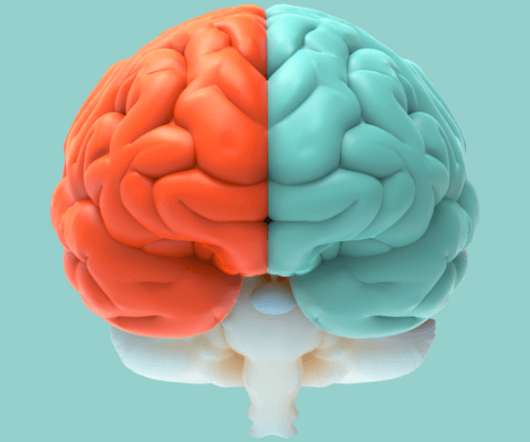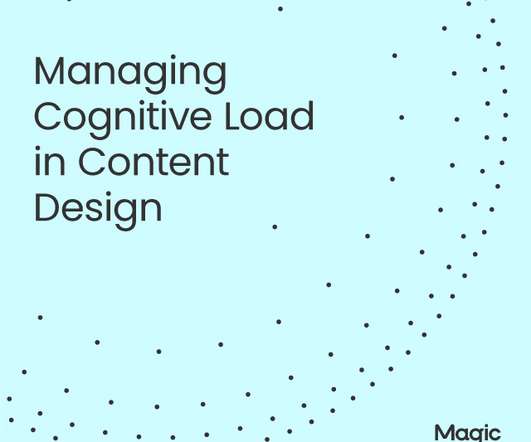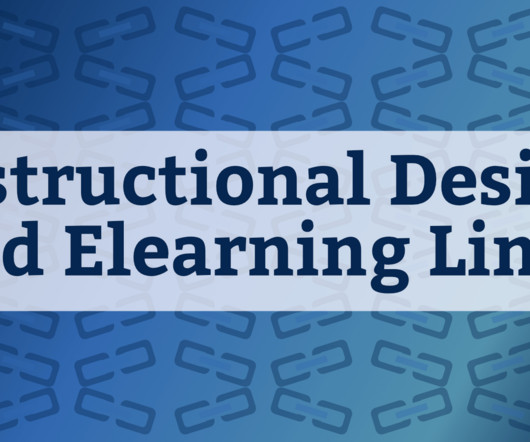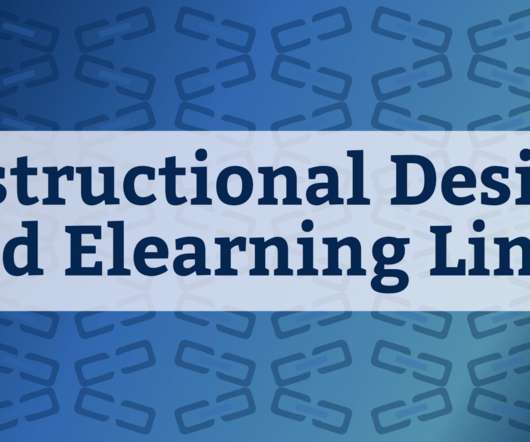Learning and Cognitive Load
B Online Learning
FEBRUARY 25, 2015
In a previous post, I looked at the fundamentals of cognitive load theory.
This site uses cookies to improve your experience. By viewing our content, you are accepting the use of cookies. To help us insure we adhere to various privacy regulations, please select your country/region of residence. If you do not select a country we will assume you are from the United States. View our privacy policy and terms of use.

B Online Learning
FEBRUARY 25, 2015
In a previous post, I looked at the fundamentals of cognitive load theory.

Origin Learning
OCTOBER 15, 2014
What is cognitive load theory (CLT)? Attributable to John Sweller who developed this theory after thoroughly studying problem solving, CLT provides guidelines for improving learning and retention by focusing on the memory capacity of human beings. This is what a schema does: it helps in shedding some of the cognitive load.
This site is protected by reCAPTCHA and the Google Privacy Policy and Terms of Service apply.

eLearning Industry
NOVEMBER 3, 2023
Schema theory, proposed by Jean Piaget in 1952, is a fundamental concept in the field of cognitive psychology that focuses on how individuals organize and process information. Piaget's theory explains how people develop cognitive structures, or "schemas," to make sense of their experiences.

TalentLMS
DECEMBER 7, 2015
In this article, I’ll shed light on the situated cognition theory, from its core principles to tips that will help you use it in your next eLearning course. Situated cognition is based on the idea that learning is most effective when it is in context. 4 Situated Cognition Best Practices. According to J.

Advertisement
Cognitive science theories already supply the answers. Learner engagement and retention doesn’t have to be a mystery. Learn how OttoLearn packages them into a single platform you can use to deliver microlearning based reinforcement training, and go beyond completions to focus on outcomes.

B Online Learning
SEPTEMBER 7, 2017
Research into our cognitive architecture has lead to the development of Cognitive Load Theory (CLT) and related guidelines which, when applied, results in more efficient learning. It offers principles and instructional guidelines. It’s evidence based, there’s been lots of studies and experiments to test the theory.

eLearning Industry
MARCH 8, 2024
What implications do these learning theories have for Instructional Designers and on the way they approach instruction? This post was first published on eLearning Industry.

eLearning Industry
APRIL 16, 2021
Cognitive load theory explains why it’s important to give employees exactly what they can handle, in a format that makes sense, so that they can learn, retain, and make use of the training. Here’s your guide to cognitive load theory and why it's so incredibly important to employee learning.

LearnDash
FEBRUARY 2, 2021
If I had to guess, I would say that most online educators don’t think of themselves as “instructional designers.” This is where instructional design comes in. During the twentieth century, four major learning theories emerged, and each has lessons that online educators can learn from to design better courses.

Learningtogo
FEBRUARY 16, 2017
This is an example of what we call “cognitive overload.”. Cognitive Load Theory was introduced by John Sweller to explain why people have so much more difficulty learning complex content. Aerospace companies, for example, consider cognitive load when they design airplane and spaceship control panels.

Association eLearning
SEPTEMBER 20, 2017
a)cognitive overload. a) cognitive overload. By being shorter and more targeted than traditional course-length learning, microlearning helps manage cognitive load (how much information a learner is being asked to process at the same time) to prevent overload. True or False? Fill in the blank. This helps avoid. Fill in the blank.

ID Mentors
MARCH 27, 2019
Cognitive load theory is credited to the work and research of John Sweller in the 1980s. In this article, I try and decode it to help Instructional Designers understand the concept and apply it when they design learning material. Hopefully, this will reduce Cognitive Load! Hopefully, this will reduce Cognitive Load!

eLearning Industry
NOVEMBER 23, 2019
As learning designers, you have certainly heard of cognitive load theory and it has helped you make informed design decisions. According to cognitive load theory, working memory should not be overloaded in that it disrupts learning because that is where learning is being processed.

Mike Taylor
SEPTEMBER 1, 2023
” Last Week’s Most Clicked 10 Ways an Instructional Designer Can Get in Trouble or Fired by Using ChatGPT or AI News & Notes Cognitive Load Theory: Research you really need to understand The “Cognitive Load Theory” explains how our brain processes and retains information, emphasizing that it can handle limited new data at once.

Magic EdTech
DECEMBER 22, 2021
Cognitive load theory in Instructional Design comes to the rescue. The theory was proposed by John Sweller in 1988 and is built on the way the human mind processes information. Cognitive load relates to the amount of information the working memory can hold. The focus of cognitive load theory is to do just that.

Mike Taylor
JULY 14, 2023
Cognitive load is influenced by motivation, task elements, and background knowledge. Take away : Cognitive load theory provides valuable insights into how various factors impact our ability to effectively use our working memory resources Learn more → Slow Ideas Some innovations spread fast.

eLearning Industry
MAY 22, 2019
Reducing cognitive load can make all the difference when designing great digital learning content. But, given the fact that most of us don’t have a degree in psychology, what exactly does cognitive load mean, and how can it be reduced? This post was first published on eLearning Industry.

eLearning Brothers
JUNE 20, 2018
When I’ve attended eLearning conferences and workshops, one thing I’ve noticed is that instructional designers are always hungry for more research and knowledge on how people learn and what they can do to help them learn better. Marty is an expert on cognitive science and learning experience design. Give us a ring!

Learning Everest
MARCH 1, 2024
In the learning sphere, many theories of cognition and memory guide instructional design. One such theory is Craik and Lockhart’s Levels of Processing Theory. First proposed in the 1970s, this theory takes a unique approach to how people remember information.

Magic EdTech
FEBRUARY 16, 2021
Cognitive load theory, Instructional Design theory comes to the rescue, it prescribes a scientific way to design learning materials at a pace and level of complexity that the learner can fully understand. The theory was proposed by John Sweller in 1988 and is built on the way the human mind processes information.

Academy of Mine
NOVEMBER 15, 2020
Cognitive Learning Theory is a useful theory for looking at education in a modern way, which focuses not just on the student’s ability to repeat the information they have been taught, but instead asks why and how a student was able to learn, and what their innate mental processes and previous life experiences had to do with that learning.

The eLearning Coach
APRIL 23, 2019
John Sweller, who formulated cognitive load theory, explains how instructional designers can design more effective learning experiences.

Kapp Notes
NOVEMBER 7, 2011
The concept of cognitive apprenticeship is grounded in the theory of Situated Cognition. Situated cognition is a theory of instruction that suggests learning is naturally tied to authentic activity, context, and culture. They are each part of a mutually constructed whole.

Experiencing eLearning
MARCH 14, 2023
This post includes links on growth mindset, an AI tool for instructional design, branching scenarios, accessibility, and a magazine issue with elearning articles by multiple prominent authors. Growth mindset Ask the Cognitive Scientist: Does Developing a Growth Mindset Help Students Learn?

EduPivot Knowledge Center
FEBRUARY 1, 2024
The conditions of learning theory, developed by American psychologist Robert Mills Gagné, provides a framework that companies can use when designing their learning and development programs. Gagné’s theory also introduces nine events of instruction. Gagné’s theory also introduces nine events of instruction.

eLearning Industry
MAY 10, 2019
Let’s take a closer look at 7 common causes of cognitive overwhelm that every eLearning pro should know about. There’s only so much a mind can take before it starts to overload and block incoming facts and stats. This post was first published on eLearning Industry.

Learningtogo
JANUARY 17, 2023
Cognitive science is a branch of psychology that attempts to explain human behavior by understanding how we think. Like cosmology, quantum physics , and many other branches of science, cognitive psychology employs models to describe something that can’t be directly observed.

Creativ Technologies
MAY 21, 2021
Instructional designing as an industry has boomed up. So for any booming instructional designer, it’s important to understand that he can gain knowledge about such principles to improve the quality of his work. Any instructional designer should follow the following practices. This theory is all about skill formation.

Experiencing eLearning
JANUARY 2, 2024
The modality principle In Clark and Mayer’s eLearning and the Science of Instruction , they say that the research generally supports using narration with on-screen visuals. In that original discussion, Judith Reymond asked about the research on when or whether audio narration is helpful to adult learners.

Magic EdTech
MARCH 8, 2022
Behaviorism, cognitivism, and constructivism are prominent learning theories that suggest the psychological ideas about human nature and how they learn. These learning theories provide the foundation for the most effective instructional design strategies. Let’s talk about the distinct perspectives of the learning theories.

Clark Quinn
NOVEMBER 23, 2021
Yet, I realize that there may be another legacy, a cognitive one. The cognitive approach is certainly more recent than the Industrial Age, but it carries its own legacies. Yet we also are good at pattern-matching and meaning-making (sometimes too good; *cough* conspiracy theories *cough*). The premise comes from business.

Adobe Captivate
OCTOBER 12, 2018
In Ireland and the UK, we have a shortage of Instructional Designers, Developers and Trainers to meet demand. Knowledge of following theories and models: Situated Cognition Theory. Sociocultural Learning Theory. Merrill’s Principles Of Instruction. Individualized Instruction. The ADDIE Model.

TalentLMS
JUNE 16, 2022
There are a number of different adult learning theories that can be used to guide employee training, each with its own advantages and disadvantages. In order to choose the best approach for your business, it is important to understand the key concepts of each theory. Theories of learning for employee training. Cognitivism.

E-Learning Provocateur
JANUARY 12, 2010
Academia is teeming with learning theories. It can be quite a challenge for the modern learning professional to identify an appropriate learning theory, draw practical ideas from it, and apply it to their daily work. Which theory do you choose? How does it relate to other theories? Where do you start? Overarching themes.

Matrix
APRIL 29, 2021
Continuing our series about adult learning theories series that instructional designers should know before creating training courses, we’ll explore experiential learning today. The Theory of Experiential Learning. For example, AR and VR allow instructional designers to make experiences even more believable.

Kapp Notes
MAY 23, 2011
Here are some thoughts and ideas related to Albert Bandura’s social learning theory. Bandura’s social learning theory indicates the effectiveness of human social models in influencing another to change behaviors, beliefs or attitudes, as well as social and cognitive functioning.

Clark Quinn
NOVEMBER 16, 2021
I want to dig a wee bit further into the cognitive and formal aspects of this to backstop her points. Also, of course, to make the point that a cognitive perspective provides important insight.). This naturally includes cognition as the basis for learning, experiences, and design. Creativity is the flip side of innovation.

Matrix
APRIL 27, 2021
Instructional designers strive to make these happen because they are extremely powerful and can make an entire course. Read more: What instructional designers need to know about behavioral change. Read more: What instructional designers need to know about behavioral change. ” moment is both cognitive and emotional.

Experiencing eLearning
MARCH 8, 2022
… We must be able to see the gaps in our instructional design, which learning science helps to support. If we want to avoid doing slide presentations, we have to know what cognitive (and emotional) advantages these technologies have so we can leverage them for success. 50 Totally Free Lessons in Graphic Design Theory.

Clark Quinn
MARCH 28, 2023
Ruth, you should know, is the co-author of eLearning and the Science of Instruction , amongst other books, a must-have which leverages Rich Mayer’s work on multimedia learning. From John Sweller’s work on cognitive load theory, we know that processing the unnecessary data reduces cognitive resources available to support learning.

Clark Quinn
JUNE 8, 2021
First, of course, I have to point out my own Learning Science for Instructional Designers. She writes about new facets of cognition that open up a whole area for our understanding. Well-illustrated with examples and research, she covers embodied cognition, situated cognition, and socially distributed cognition, all important.

Ed App
NOVEMBER 5, 2019
WHAT IS COGNITIVE OVERLOAD? Firstly, what is cognitive overload? Cognitive overload is based on cognitive load theory, a theory within educational psychology and information processing. SO HOW CAN I EASILY REDUCE MY LEARNER’S COGNITIVE LOAD? Schemas are where we went our learning content to end up.

eLearningMind
JANUARY 13, 2024
Learning design vs. instructional design While learning design and instructional design are closely related, they have distinct differences in their focus and objectives. Instructional design primarily centers around the creation of instructional materials and resources that facilitate learning. A: We ask “Why?”
Expert insights. Personalized for you.
Are you sure you want to cancel your subscriptions?


Let's personalize your content